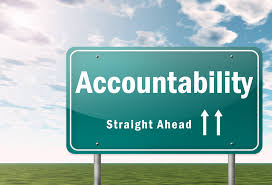Out of all the resources a person could have to transcend their addiction permanently, there is one vital yet often “missing link” that glues an individual’s commitment to results. And an educated guess that is common among us addiction professionals is that 99% of people without this missing link are unable to conquer their addiction and never go back to that lifestyle.
This missing link that is so powerful it radically increases your chances of success is accountability.
I’ve realized that one of the main reasons I receive a steady stream of coaching clients is due to so many individuals realizing the benefits of having someone hold them accountable.
Of course, plenty of people can overcome addiction without accountability.
But I’ve found that accountability significantly increases recovery success rates.

What is Accountability?
Accountability is “the fact or condition of being accountable.” Accountable is an adjective that means “answerable for actions or decisions.”
Basically, to hold someone accountable means the person is being asked to explain why they did (or didn’t do) something.
Employees are held accountable for what they do and don’t do at work.
Whenever I had jobs where my boss was out of town and there was no one holding me accountable, I tended to slack off and do the least amount of work possible.
But whenever my boss was there and working with me, I made sure I was working hard and doing my best!
I had someone to answer to, and I didn’t want to let my boss down… or get fired.
Why is Accountability Important?
As humans, we are biologically wired to seek comfort and avoid discomfort. We typically look for and take the path of least resistance in all that we do.
When setting goals and implementing action steps to achieve them, without being accountable to someone, most people end up putting their goals on hold or quitting altogether.
This is easy to do because we don’t have anyone to answer to.
We can rationalize our way out of it with effortless ease.
However, when someone is holding us accountable, our chances of achieving the goal skyrocket.
Here are common reasons this happens:
- We don’t want to let the person down
- We don’t want to look like a failure
- We want to be seen as the type of person that keeps their word
- We want to avoid looking like a flake
- We want to avoid feeling guilt and shame
- We want to act congruently with our decisions
Having accountability is a very helpful resource when it comes to transcending addiction, and it can be the magic ingredient that makes everything else fuse together.

Ways to Create Accountability
There is a superabundance of ways to create accountability. The important concept to learn is to use a method of accountability that you feel would help YOU the most.
We are all different, so what works for one person won’t work for everyone.
Here are some examples of accountability to choose from:
- Have your spouse hold you accountable
- Go to an inpatient treatment program where the doctors and counselors hold you accountable
- Hire a recovery coach to help you come up with a plan to quit and to hold you accountable
- Ask your doctor to hold you accountable
- Ask your psychiatrist to hold you accountable
- Have a best friend that you love and respect hold you accountable
- Go to self-help meetings and ask the group to hold you accountable
- Have an AA or NA sponsor hold you accountable
- Have your church pastor hold you accountable
- Join a Facebook recovery group and ask the members to hold you accountable
- Do a social media post announcing your plan to quit opioids and the date you intend to do it
- Find another person that wants to quit opioids, and see if they want to be your accountability partner
- Have your parents hold you accountable
- Have your children hold you accountable
Along with this comprehensive list, there are also many other ways you can create strong accountability.
Exercise: Write down all of the methods of accountability from the list above that you believe would help you the most. Brainstorm accountability methods that aren’t on this list, but that you’d find helpful. Then write a paragraph or two on why these would help you so much. Commit to creating these methods of accountability, and take joy in the fact that you’ve just significantly increased your chances of succeeding.
Here are the main topics discussed in this episode:
- The definition of accountability
- Why accountability is so important and helpful for addiction recovery
- Why it’s difficult for people to admit to loved ones they have an addiction
- Guilt and shame from feeling unworthy of love and acceptance due to having a substance use disorder
- The lack of understanding, empathy, and compassion from people that have never had a substance addiction
- Ways to create a strong sense of accountability and support
- Why it’s easy to stay addicted or to relapse without a support and accountability system
- Example of Matt Finch’s story of finally quitting drugs for good when he had an accountability and support system
- Online accountability and support methods
- In-person accountability and support systems
- Quality over quantity when creating an accountability and support system
- Why focusing on what you can control in life and what you have that you’re grateful for is much better than focusing on things that you can’t control and things that are lacking from your life
- Hiring a recovery coach, therapist, or other addiction professionals as a form of accountability, support, and strategy formation
- Joining online courses about addiction recovery where there are others that you can connect with and get accountablity, support, and recovery tools
Resources mentioned in this episode:
- Ultimate Opiate Recovery Coaching
- Academy of Opioid Addiction Recovery
- Ultimate Opiate Detox 4.0
- Ultimate Kratom Detox
- Ultimate Suboxone Detox
- Total Opiate Recovery
- Total Alcohol Recovery 2.0
Right-click here and save as to download this episode on your computer.




Leave a Reply